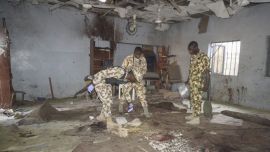The Copa América is bringing back memories of the Qatar World Cup for Argentines, a peak of national euphoria in decades. This was December 2022: a time when a Javier Milei presidency was nobody’s baseline scenario — not even his own.
President Milei might be excused for believing his unexpected win was a feat comparable to being a world champion in any discipline and he does not keep this thought to himself. In every public appearance and social media post, Milei boasts about his own self-perceived greatness. This week, he took it to the extreme by claiming that he was “rewriting a large part of economic theory,” a claim he believes could earn him and his name-checked economic advisor, Demian Reidel, the Nobel Prize in Economics.
It is difficult to be the best in the world, but proclaiming oneself as such is futile. For instance, Messi has never declared himself the best. This makes him quite un-Argentine if one considers popular belief both locally and internationally. Messi has arguably been the best in his field for over two decades, receiving plenty of external validation, including eight Ballon d’Or awards. However, individual achievements were incomplete — especially for the demanding Argentine public — until he developed the leadership capacity to achieve something unattainable on his own: the Copa América in 2021 and the World Cup a year later. This came in the mature phase of his career.
Argentina’s national football team, now acclaimed and admired worldwide, stands in stark contrast to Argentine politics. Until four years ago, Argentine football carried the burden of more than three decades of frustration that culminated in a “que se vayan todos” type of moment. Even Messi, the best in the world, was pressured to step aside after a Copa América final defeat.
Reconstruction came with humble rather than exuberant leadership. It started by acknowledging that a great victory required a constructive, long-term approach and that, even with that, no result was guaranteed. Messi only once has diverted from this prudent, laborious path when he shouted the now-famous phrase “Andá pa’llá, bobo” (“Go over there, fool”) at Dutch striker Wout Weghorst after Argentina’s dramatic quarter-final match against the Netherlands. He later apologised.
Milei, however, is not an apologetic character. This week, Brazil’s Luiz Inácio Lula da Silva demanded an apology after Milei called him “a corrupted Communist.” He was denied one. Additionally, Milei accused Rodrigo Valdés, the IMF economist in charge of the Argentine debt case, of leaning to the left, at a time when the multilateral lender’s staff are becoming increasingly critical of the lack of progress in the economic programme’s monetary aspect. Locally, Economy Minister Luis Caputo claimed the parallel exchange rate rose in recent weeks because the political establishment was blocking the government’s agenda.
The IMF does not see Nobel material here, as reflected in its latest staff report. The INDEC national statistics bureau also released alarming data detailing the state of the real economy this week: GDP collapsed by 5.1 percent in Q1 year-on-year, unemployment rose by 0.8 percentage points to 7.7 percent, and investment declined by over 12 percent. The currency is also suffering due to market and investor uncertainty about the programme’s direction.
Accepting and tackling a problem is more difficult than finding someone to blame. Argentine politics has been playing the blame game for years (decades?), and in this regard, Milei is no different from the political establishment he claims to despise. Being the best is easier said than done. Although Messi was often said to be the best, he never felt it until he had the undisputed evidence of lifting the most important team trophy in world football. To achieve that, he needed help, including from a relatively obscure full back named Gonzalo Montiel, who made history by scoring the winning penalty in the World Cup final. Milei continues to claim that his ministers, even controversial ones like Human Capital Minister Sandra Pettovello, are “the best ever.” Until they are not, as his former friend and Cabinet Chief Nicolás Posse can attest.
So far, the closest the words “Milei” and “Nobel” have come in any context – other than his own speech – has been in a letter signed by over 60 laureates warning that the government’s budget cuts were leading Argentina’s science and technology system toward “a dangerous precipice.” They specifically mentioned the decimation of the CONICET institute for scientific and technological research. Less known than Messi, many of the people who work and study there are also among the very best in the world in their field.



















Comments